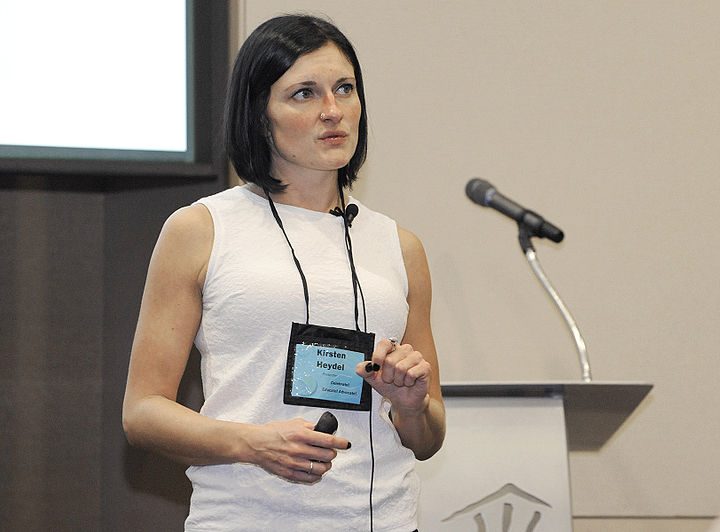Winner of the Fall 2018 StMU History Media Award for
Best Article in the Category of “Human Rights”
Have you ever wanted to make some easy money by selling your old stuff? Thanks to websites like Craigslist and Backpage, you can. Both Craigslist and Backpage are two of the largest classified advertisement websites. They allow you to search for and sell items in and around your local area. They even give you the option to post advertisements for job listings, events and activities. Craigslist was founded in 1995, and Backpage was founded in 2004.1 Craigslist is owned by its founder Craig Alexander Newmark, and Backpage was formerly owned by Village Voice Media and was run by its former CEO Carl Ferrer. Backpage is now owned by a Dutch company called Atlantische Bedrijven CV.2 These websites may seem like a harmless way to look for products and services, but the truth is these websites had a personal ad section that made it easy for young girls and women to be sexually exploited.

The personal ad section on these websites allowed for people to meet men and women in their area. Typically, these ads were used to find someone to date or with whom to have casual sex. Although these personal ad sections were intended for people to connect and interact with other persons, they were misused. These ads turned into the perfect platform for pimps and traffickers to promote the sale of women and children for sex. As shocking as it sounds, research has shown that the internet is a common tool for sex traffickers to use. Using the internet allows traffickers to reach a larger number of potential clients while eluding law enforcement.3 For them, the internet is the safest way to make money. The service providers Craigslist and Backpage, however, did nothing to stop people from using their websites in this way. Instead of preventing the ads from being posted or taking them down, they published them.
Several people filed lawsuits against Craigslist and Backpage because they wanted these websites to be held liable for publishing sex ads.4 After being faced with backlash, Craigslist and Backpage agreed to implement some requirements for their advertisements. In 2008, Craigslist required a fee for those persons posting in the “adult services” part of their personal ad section. The fee ranged between 5-10 U.S. dollars per ad. People would need to use a valid credit card and provide a verifiable phone number. This requirement, however, did not have much of an impact. Many traffickers simply used fake credit cards and phone numbers to pay the fee.5 Through these fees, Craigslist and Backpage made a huge profit. Craigslist made $44.6 million from their adult services advertisements and Backpage made $24 million.6 Their adult section, however, was the only one with a fee attached. To get around the fee, people would simply post their sex ads in other sections. Another attempt made by Craigslist and Backpage to reduce the chances of sex trafficking was removing posts with words such as “sexy” and “young.” This also proved to be ineffective. People would use code words so that their ads would not be removed. For example, pimps and traffickers used words like ‘new’ to indicate that the girl was a minor. Backpage even helped to edit advertisements by changing the words so that they would not get flagged or reported.7 The websites changes were not effective in reducing the number of sex ads posted. Craigslist and Backpage still failed to consistently block ads for illegal activity such as sex trafficking.

Many women and children were trafficked through these websites. In one case, three young women were repeatedly raped while they were minors when they were sold through Backpage’s website. Each of these victims filed a lawsuit against Backpage back in October 2014. This case is known as Doe v. Backpage.com. The lawsuit claimed that the classified ad company had engaged in sex trafficking of minors. They argued that the websites were engaged in trafficking since they did such a poor job in governing the content of the ads being posted. The U.S. Court of Appeals for the First District ruled in favor of Backpage and held that Backpage was protected under U.S. Code Title 7 Section 230, more commonly known as the Communications Decency Act (CDA). 8
] The purpose of the CDA is to regulate interactive computer services. The CDA makes it the policy of the United States “to preserve the vibrant and competitive free market that presently exists for the Internet and other interactive computer services” and “to ensure vigorous enforcement of Federal criminal laws to deter and punish trafficking in obscenity, stalking, and harassment by means of computer.”9
In their decision, the Court of Appeals argued that by claiming that Backpage facilitates sex trafficking through its posting rules, you are treating Backpage as the publisher of the content which the CDA prohibits. Section 230 subsection (c) states, “No provider or user of an interactive computer service shall be treated as the publisher or speaker of any information provided by another information content provider.”10 The Court believed that Backpage should not be held responsible for what its customers convey on its website. Just a year prior to this case, another lawsuit was brought against Backpage. This case was Backpage.com, LLC v. Cooper. In this case, just like in Doe v. Backpage.com, Backpage argued that they had no knowledge of the content posted on their website. The Court ruled that their classified ads were protected under the First Amendment of the Constitution. They argued that it is unlawful to censor an entire category of speech on a website. They also stated that it would place “an impossible burden” on Backpage to review the millions of ads posted on its website.11
Just like Backpage, Craigslist was faced with numerous lawsuits. Those who brought lawsuits against Craigslist wanted them to be liable and accountable for allowing such advertisements to be published on their website.12 Many advocates fought hard against these two companies. They wanted the sex advertisements on these websites to be criminalized, and to put an end to the use of online classified ads to exploit both adults and children.

The most recent legislation dealing with online sex trafficking was introduced by the Senate. Earlier this year, it was passed by Congress. This piece of legislation is an anti-sex-trafficking bill known as the Stop Enabling Sex Traffickers Act. This act is an exception to Section 230 of the CDA. This Act states, “section 230 was never intended to provide legal protection to websites that facilitate traffickers in advertising the sale of unlawful sex acts with sex trafficking victims; and that clarification of section 230 is warranted to ensure that that section does not provide such protection to such websites.“13 Essentially, this Act allows for sex trafficking victims to sue the websites through which they were trafficked. As a result from the passing of this bill, Craigslist shut down its personal ad section; however, this website remains active today. Backpage, on the other hand, was seized by the FBI and it remains seized to this day. Although action was taken against these websites, there are still several other active websites similar to Craigslist and Backpage. Those who relied on the two sites for sex trafficking have turned to other places on the internet. Shutting down sex advertisements in these cases have not stopped pimps from trafficking young girls and women online; it has just moved their operations to other providers. Despite efforts to target and censor websites like Craigslist and Backpage, trafficking displacement is an inevitable consequence.14 The FBI, however, is making an effort to monitor different forms of illegal activities online, especially sex trafficking. One way we can help fight online sex trafficking is by going after those websites that allow it to happen. If you go to the FBI website, you will find information on how to report instances of human trafficking. The FBI informs us to call the National Human Trafficking Resource Center (NHTRC) if we believe that we are a victim of a trafficking situation or if we have information on a potential trafficking situation. We can reach the NHTRC at 1-888-373-7888, where we can talk to specialists who answer calls at anytime from anywhere. 15 Do not be afraid to seek out help or to report what you believe may be a trafficking situation. Let’s help put an end to online sex trafficking!
- Shana M. Judge, “The Effect of Measures Taken by Craigslist to Screen Online Ads for Commercial Sex,” Social Science Computer Review 36, no. 3 (June 2018): 298. ↵
- Marie- Helen Maras, “Online Classified Advertisement Sites: Pimps and Facilitators of Prostitution and Sex Trafficking,” Journal of Internet Law 21, no. 5 (2017): 17. ↵
- Erin Heil and Andrea Nichols, “Hot Spot Trafficking: A Theoretical Discussion of the Potential Problems Associated with Targeted Policing and the Eradication of Sex Trafficking in the United States,” Contemporary Justice Review 17, no. 4 (2014): 422. ↵
- Shana M. Judge, “The Effect of Measures Taken by Craigslist to Screen Online Ads for Commercial Sex,” Social Science Computer Review 36, no. 3 (June 2018): 298. ↵
- Shana M. Judge, “The Effect of Measures Taken by Craigslist to Screen Online Ads for Commercial Sex,” Social Science Computer Review 36, no. 3 (June 2018): 299. ↵
- Erin Heil and Andrea Nichols, “Hot Spot Trafficking: A Theoretical Discussion of the Potential Problems Associated with Targeted Policing and the Eradication of Sex Trafficking in the United States,” Contemporary Justice Review 17, no. 4 (2014): 428. ↵
- Erin Heil and Andrea Nichols, “Hot Spot Trafficking: A Theoretical Discussion of the Potential Problems Associated with Targeted Policing and the Eradication of Sex Trafficking in the United States,” Contemporary Justice Review 17, no. 4 (2014): 429. ↵
- Kerianne Strachan, “Doe v. Backpage.com: The United States Court of Appeals Further Extends Immunity for Internet Service Providers Under the Communications Decency Act,” Tulane Journal of Technology & Intellectual Property 19, (2016): 262 and 47 U.S. Code § 230 – Protection for private blocking and screening of offensive material, and S.652 – Telecommunications Act of 1996 enacted by 104th Congress (1995-1996). ↵
- § 230. Protection for private blocking and screening of offensive material, 47 USCS § 230 ( Current through PL 115-253, approved 10/3/18 ). https://advance-lexis-com.blume.stmarytx.edu/api/document?collection=statutes-legislation&id=urn:contentItem:4YF7-GV61-NRF4-44C3-00000-00&context=1516831. ↵
- § 230. Protection for private blocking and screening of offensive material, 47 USCS § 230 ( Current through PL 115-253, approved 10/3/18 ). https://advance-lexis-com.blume.stmarytx.edu/api/document?collection=statutes-legislation&id=urn:contentItem:4YF7-GV61-NRF4-44C3-00000-00&context=1516831. ↵
- Marie-Helen Maras, “Online Classified Advertisement Sites: Pimps and Facilitators of Prostitution and Sex Trafficking,” Journal of Internet Law 21, no. 5 (2017): 18. ↵
- Shana M. Judge, “The Effect of Measures Taken by Craigslist to Screen Online Ads for Commercial Sex,” Social Science Computer Review 36, no. 3 (June 2018): 298. ↵
- S. 1693, 115th Cong. (2018) Stop Enabling Sex Traffickers Act (enacted). ↵
- Erin Heil and Andrea Nichols, “Hot Spot Trafficking: A Theoretical Discussion of the Potential Problems Associated with Targeted Policing and the Eradication of Sex Trafficking in the United States,” Contemporary Justice Review 17, no. 4 (2014): 432. ↵
- “Human Trafficking/Involuntary Servitude.” FBI. May 03, 2016. Accessed October 30, 2018. https://www.fbi.gov/investigate/civil-rights/human-trafficking. ↵



180 comments
Lynsey Mott
Sex trafficking is such a horrendous act for a human being to do. To steal, sell or buy someone, whether it be on the internet or in person, no one should suffer through that. Honestly sites like craigslist should have to have more screening of what they sell, and I know that there are already a lot of people watching them, but they need to be more than that. Thousands of women, men, and children are being sold as we speak and its so sad.
Jocelyn Moreno
WOW, I had no idea that craigslist use to be used for sex trafficking nor did I know that people would sex traffick online. That is so crazy but yet it is true. I can’t believe that in the beginning, these websites would “help” them just because of the amount of money they would be bringing in for these companies, it took them going to court to be stopped and that is sad to me. This is a reality and we need to put a stop to sex trafficking online and in real life.
Raymond Nash Munoz III
For Craigslist and Backpage to do so very little to stop the trafficking is ridiculous and I don’t understand why they weren’t shut down the second this was discovered. Though, just like the article stated, Backpage was seized and Craigslist took down its personal ads and sex trafficking is still active online because these horrendous people are so strong willed. But that is exactly where I am love the fact that the article concluded with how we can help because then we can fight the trafficking with our combined will and hopefully overcome the evils of sex trafficking. Overall, this article had amazing content and structure.
Congratulations on your nominations!
Alyssa Garza
The title alone caught my attention because I do go to Craigslist just to see what they have or because sometimes they have tickets for different events posted. I never knew that this website was used for sex trafficking which is terrifying. I hope all the FBI and other organizations that keep an eye on this sort of thing catch the red flags and put a stop to it.
Nathalie Herrera
A very informative article, that highlights the misuse of platforms like Craigslist and Backpage. Prior to this article, I had no idea that these websites provided a platform for traffickers. A platform, that enabled them to promote the sale of women and children for sex. It is truly disturbing that despite efforts made to minimize the exploitation of women by removing words like “young”, traffickers would just modify the word to “new”. Hopefully, this is put to an end soon.
Enrique Segovia
Congratulations Cynthia Rodriguez for your nomination in the category of Best Article in the Category of “Crime”! Honestly, I though this article was also going to be nominated for Best Title because I read this article because the title of the article intrigued me. Regardless, this article was great, due to the valuable information that it revealed to its readers. Knowing that Craigslist and Backpage were not acting upon this sex trafficking scandal because it was giving them a profit is just hideous and it made me realize what some big businesses have to deal with.
Sofia Resendiz
Reading this article was so eye opening for me. I was totally unaware that human trafficking was taking place through common websites such as craigslist and backpage. I also did not know that they had a personal section that consisted of many uses. I am glad that a law was passed to actually make some improvement. It was sad that these websites would win lawsuits.
Devin Ramos
This article did a good job at detailing the problem that these websites have created because I have never heard of craigslists or back page being used for sex trafficking you would think that this would not be a problem. Its crazy to think that people actually use these websites to get women and rape them it’s also crazy that this website has not done more to stop these illegal actions from happening.
Kristy Feather
As someone who knows a lot of people to use craigslist, hearing that is has been used for sex trafficking is terrifying. Although I know the FBI, DEA and CIA all have groups that are specified to watch out for red flags, but things still fall through the filter all the time.
Valeria Perez
It is crazy to think that such a well-known website such as Craigslist has allowed and is still allowing for this to happen! It is very dishonest and reflects bad on the company that they have found so many ways to avoid taking actions. It is in situations like this that I get scared of the power the internet has. Great article!